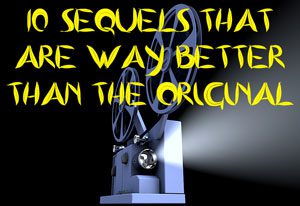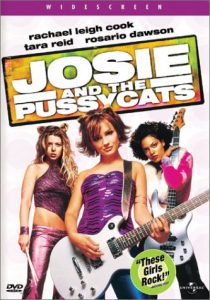The Archie Comics gang debuted in 1941 and still hold their place as American high school archetypes. They made the leap to cartoons in the ’60s, to a TV movie in 1990 (“To Riverdale and Back Again”) and to a live-action series in the mid-’90s (“Sabrina, the Teenage Witch”). Those adaptations were tame and straightforward. But recently, creative types have found that the Archie material and characters can provide a solid foundation for modern social commentary, with a more serious comic line launching in 2015 and the murder mystery TV serial “Riverdale” debuting last month on The CW.
The movie “Josie and the Pussycats” (2001), though, stands as the first example of Hollywood modernizing Archie characters. And, although most people disagree (it rates a 5.3 on IMDB, even lower than “To Riverdale and Back Again’s” 5.8), I think it holds up as a smart satire of consumer culture and corporatism, a snapshot of a more innocent time in the world before 9/11, a snapshot of a LESS innocent time in the music industry, and overall bubbly fun exemplified by the fashions and pop songs.
Staying true to the comic-book portrayals, lead singer/guitarist Josie (Rachael Leigh Cook), bassist Valerie (Rosario Dawson) and drummer Melody (Tara Reid) are a struggling garage band in Riverdale. (Unlike the new TV show, you won’t get much of a sense of Riverdale here, and not even a mention of Archie, Betty or Veronica.) When they get recruited by MegaRecords, the material diverges from its comic roots: The trio is whisked through a CD recording, promotional stops and an arena gig. Along for the ride are their manager, Alexander; a possible love interest for Josie, Alan M.; and hanger-on Alexandra, who – when asked why she’s on the journey – notes “Because I’m in the comic.”
With that moment, along with label manager Wyatt (Alan Cumming) breaking the fourth wall after he frames the future-star Pussycats in his headlight beams, “Josie” takes its place among the early wink-at-the-audience meta movies.
But product placement is the biggest running joke, and boy do they play it big. Josie appears on Diet Coke cans, and items ranging from Bounce dryer sheets to Pringles snacks pop up regularly. Wyatt’s previous charges, the boy band Du Jour (featuring Seth Green and Breckin Meyer), travel in an airplane covered with Target logos. The Pussycats’ final concert is brazenly presented by Kodak.
Although the joke is delivered with a sledgehammer, I think “Josie” deserves credit for being a forerunner of a spate of such satires in the early Aughts. It came out on April 11, 2001. Granted, this was after the February “Simpsons” episode “New Kids on the Blecch,” which – like this movie – parodied the brainwashing of teenyboppers to join the military (“Josie” pushes the Army, “The Simpsons” hawks the Navy). But it did predate September’s “Zoolander,” about the shallowness of the fashion industry.
The peppering of products throughout the sets seems like a rather ingeniously blunt approach by writers/directors Deborah Kaplan and Harry Elfont to have it both ways: to make fun of the Hollywood/marketing complex while also cashing in on it. But surprisingly, in the DVD commentary they tell us the film received no money for product placement. Collectively, these consumer goods are the villains of the piece, coming through the lens of an over-the-top sci-fi plot about subliminal “buy this now” messages, which Wyatt and Fiona (Parker Posey) pepper into the Pussycats’ tracks – and Du Jour’s, before Wyatt offs them in a plane crash in order to clear the way for a retrospective album and the Next Big Thing.

Pushing the commentary into the realm of crony capitalism rather than crass capitalism, the government is overseeing the subliminal messaging; Fiona and Wyatt are merely their underlings. Their goal – as outlined by Eugene Levy, for some bizarre reason that still fits with the overall craziness – is to get teens to spend their allowance and first-job money to grease the wheels of the economy. A vibrant economy, of course, isn’t a bad thing. The real problem, never clearly addressed by the film, is that the government is taking a chunk of that money to run the brainwashing program, and to perpetuate its bribe-and-kickback system of picking which companies are promoted in the subliminal messages.
Interestingly, the product placements are so ubiquitous that they aren’t annoying; they are just part of the fabric. Still, “Josie” perhaps throws too much satire at the screen. In the real world, there aren’t subliminal messages or any need for corporate or government conspiracies. People buy stuff they don’t need because it makes them happy; no one is forcing them. Still, there is a certain “look in the mirror” element to the movie: If you find yourself looking up how cheaply you can acquire the “Josie” movie soundtrack on Amazon, you can’t help but reflect that you aren’t always a savvier consumer than the rest of the masses.
The part about MegaRecords taking advantage of the Pussycats is unfortunately no more than skin deep. Although the band is used to sell products, the girls don’t go into debt to the label, as would be the case in the real world back when labels ruled the music-scape. (“So You Wanna Be a Rock & Roll Star” by Semisonic’s Jacob Slichter offers a good portrayal of how the scam worked.) Josie rightly notes that it’s weird that their rise to superstardom happened in less than a week, but honestly, her band is being helped as much as it’s being used. Indeed, the band itself is among the products being proffered.
And hey, the Pussycats are playing throwaway pop music even at the $20 bowling alley gig where we meet them; it’s not as if their deeply personal songs are being bastardized. Wyatt may not have listened to their music before signing them, but he would have to admit it’s nice that their songs are ready-made for mass consumption, as it saves him the step of having to provide songs for them to perform.
(It’ll be interesting to see how “Riverdale’s” Pussycats fare in today’s post-label-driven landscape. I enjoyed their cover of “Sugar, Sugar” – or perhaps it’s an original song within the show’s continuity, since it comes from “The Archie Show.”)
Instead of manufacturing the songs, Wyatt and Fiona manufacture a rift in the band, perhaps to maximize free tabloid publicity. You needn’t have seen the previous year’s “Almost Famous” to know the Pussycats will get in a tiff over Josie’s prominent place in the promotional materials – including a Times Square billboard — a la Russell in Stillwater.
Whether the shallowness is part of the joke, or whether it’s hypocrisy, the songs are pretty good for what they are, and the trio looks great on stage even though professional musicians are providing the audio. It’s too bad Kaplan and Elfont resisted repurposing “Sugar, Sugar” (as “To Riverdale and Back Again” did over the opening credits), as modern takes on ’60s pop standards would’ve been fun, but that’s not the movie they wanted to make. Just as Du Jour’s “Backdoor Lover” is a Backstreet Boys and N*Sync jab with a double entendre so blunt it would make “The Office’s” Michael Scott blanch, Pussycats songs like centerpiece track “3 Small Words” fit the early-Aughts pop-punk mode. Their tunes fall into the category of “Catchy, but I wouldn’t want to listen to them all day; but hey, it’s better than Blink-182.”
I’m a defender of this film, but I have to admit that the fact that it makes fun of prepackaged entertainment while also BEING prepackaged entertainment does seem a bit cynical, and the movie would probably leave me cold if the titular trio didn’t retain so much of their cute, comic-book soap-opera innocence. I also have a soft spot for the movie because it epically failed at something the script suggests is an easy process: getting people to buy stuff. “Josie” was a commercial failure, and many industry analysts believe this is because it was marketed to teen pop-music fans, who didn’t realize it was a satire. (That seems absurd when you watch the film today, but there are essays online by people who admit they didn’t understand the film as a kid, and now love it as an adult.)
It’s not the greatest movie ever made, like one of the not-so-subliminal frames of the film tell us. Still, as Archie archetypes get prominently repurposed in “Riverdale,” we shouldn’t forget that “Josie and the Pussycats” did a darn good job of paving the way.

